Very recently, news of about a hundred Shan State Progress Party (SSPP) troops forceful eviction from Namkham area to Muse by the Ta’ang National Liberation Army (TNLA), creating military tension, are the most talk about issue among the people of Shan State.
But hardly it was a surprise for the inter-ethnic armed organization (EAO) conflicts have been simmering ever since the end of Operation 1027, followed by the signing of ceasefire between the Three Brotherhood Alliance (3BHA) and the military junta, also known as State Administration Council (SAC), brokered by China in Kunming, in January this year.
The 3BHA is made up of Arakan Army (AA), Kokang or Myanmar National Democratic Alliance Army (MNDAA) and TNLA that launched the Operation 1027, with the blessing of China reportedly to curb down the cyber scam undertaking by Chinese nationals, in October last year and ended in January this year also because of China’s pressure. While the AA isn’t involved in the inter-EAO conflicts, the MNDAA and TNLA are having frequent frictions among themselves and at the same time with the SSPP, and to a lesser extent, with the Kachin Independence Army (KIA) which also operates within northern Shan State. Two serious armed conflicts occurred between the MNDAA and SSPP, while on-and-off small firefights also happened between the TNLA and SSPP in the aftermath of the Operation 1027.
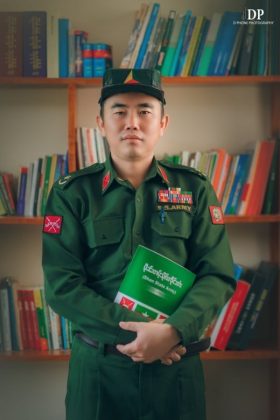
In a little more than 2 months of operations, TNLA captured more than 80 military council camps. In Northern Shan State, Namkham, Namhsan, Mantong, Kutkai, Namtu, Mong Ngaw, Mong Long are under its control. The Kokang Army also attacked and captured hundreds of military council camps in the entire Kokang region and controlled the entire region.
On May 27, the TNLA after beefing up its troops blocked, disarmed the SSPP troops stationed in villages along the Shweli River and forcefully transported them to Muse, according to the Shan News report of May 31.
Regarding the row, Ms. Lway Ye Oo, who is responsible for TNLA news and information on the issue said: “Yes, on 26 and 27 May we transported the SSPP troops with our cars to their original operational area camp in Muse. The case is smoothly resolved. The main thing is that this transportation has been discussed many times between us and the SSPP. Now we are just implementing the meeting decisions,” according to the CNI report of May 31.
On May 31, SSPP Spokesman Major Sai Phong Han responded to the TNLA Spokesperson Ms. Lway Ye Oo saying: “They can tell the media whatever they like but the reality is already there. If we have negotiated smoothly, we don’t need to use the TNLA’s vehicles, we also are not in short supply of cars,” according to People’s Spring report on the same day.
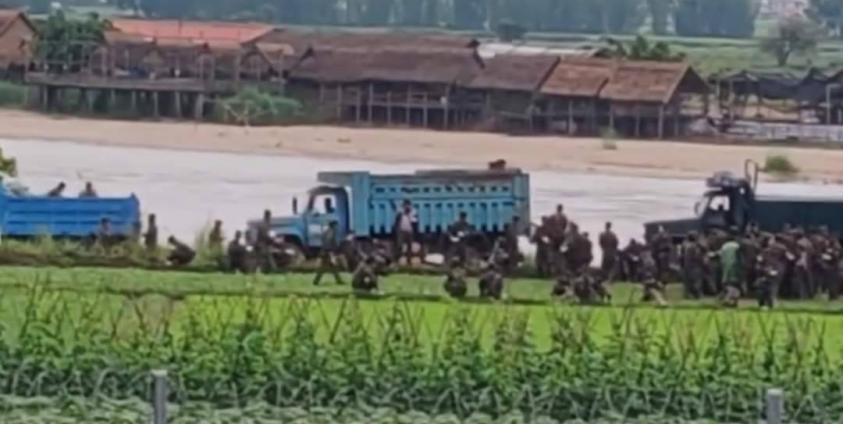
“I feel this is deceiving the public, EAOs and political organizations by slandering to hurt the SSPP’s image,” he added.
Regarding the row, Shwe Phyee Myae reported on May 31 even more directly on the rebuttal of Major Sai Phong Han, the SSPP spokesman. He said: “ The TNLA has forcefully evicted us while we were not aware. It is using media to deceive us and the public. In reality we don’t have any agreement on the movement of troops.”
In an interview most recently on question whether the SSPP has planned to reenter Namkham anytime soon to protect the Shan populace asked by SHAN on June 1, Major Sai Phong Han replied: “Now the issue is not yet resolved. It is our home that other people come to rent it. (I mean) not renting it but forcefully occupying it and staying free of charge. The owner is a kind of person who won’t let his money (fortune) slip away (without doing anything), according to Tai(Shan) way of reasoning. I can’t say much on how we are going to tackle this issue ahead of time and want our people to understand this.”
The SSPP statement gist regarding the problem issued on May 31, 2024 are:
- The SSPP upholds the “Principle of Peaceful Coexistence” between the alliance.
- On April 21, 2024 the top central-level representatives of the two forces, SSPP and TNLA, met and discussed the issue of territorial dispute.
- TNLA has no desire to live together in peace. It is obvious from the current events and the statements made by TNLA’s spokesperson Ms. Lway Ye Oo to the media.
- With the desire to gain political advantage through unethical alliance code of conduct and with the basis of racial discrimination, it (TNLA) crosses the line of tolerance. The SSPP totally (absolutely) condemns any such act of behavior as it invites unwanted military solutions.
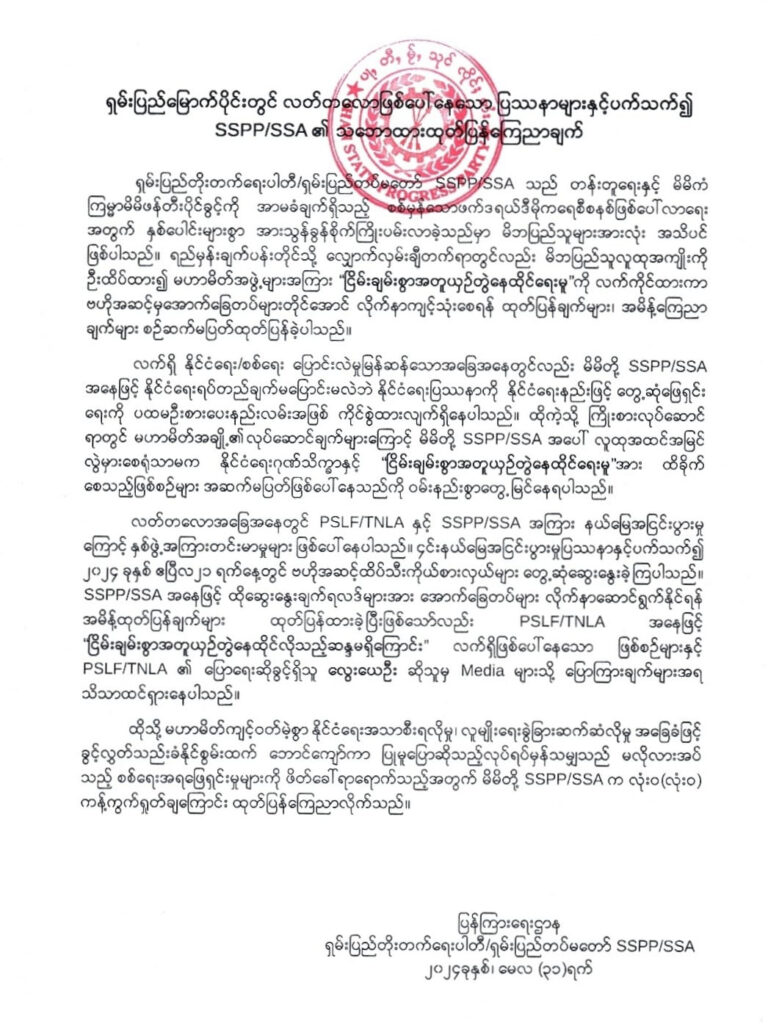
The SSPP and TNLA are members of the seven-member Federal Political Negotiation and Consultative Committee (FPNCC) headed by the United Wa State Army (UWSA). Reportedly, both have made known the unfolding problem issue to the FPNCC.
Perspective
The cause of the problem can be seen as narrow ethno-nationalism at work, coupled with territorial expansion urge of the TNLA.
Narrow ethno-nationalism in the sense of taking down other ethnic language signposts where the non-Ta’ang are in majority and treating them with disrespect; and territorial expansion as can be seen by TNLA taking over Shan majority towns and disrespecting the locals and also the existing SSPP troops. The MNDAA also act the same in Kachin area of Kutkai and also Shan majority places in Hsenwi area.
Another supporting factor may be an unspoken accepted belief that anyone who could dislodge the military junta troops from an area owns the place. The TNLA and as well the MNDAA have been using this unspoken credo to strike the semblance of legitimacy of the captured areas as their own, totally sidelining the local ethnic population consent which don’t coincide the victorious EAOs’ ethnicity. Besides, in all these overlapping areas, as Shan State being a multi-ethnic state, other EAOs also have been operating in their respective ethnic communities for a long time. For example, in Kutkai area where many Kachins called it their home, the KIA has been part of the societal life. The same is also true in areas like Namtu, Namkham, and so on where the majority Shan reside and so does the SSPP troops, even before the TNLA was formed.
Just because one EAO could kicked out the junta troops from a certain area it doesn’t necessarily belong to it. In fact, the primary owner of sovereignty is the local ethnic people themselves. In short, this winner take all argument is a theoretically a false assumption, as it exclude the already existing EAOs in the area and don’t consider them as stakeholders because they were not involved in the Operation 1027. Besides, the SSPP and KIA were kept in the dark about the Operation 1027 according to the available sources.
Another thing to ponder about is the case of Hopang and Panlong towns, which have been originally part of the Wa Self-Administered Division but administered by the military junta until they were taken over by the 3BHA during the Operation 1027. They were given to the UWSA, which didn’t took part in the operation, by the Alliance officially on January 10.
The question now is: Why hasn’t this kind of consideration been applied in Namkham? Or at least a sort of joint-administration worked out with the consent of the local people ? After all, the real sovereign power should belong to local people concerned, if the EAOs understand this and are really working for the welfare of the people.
The Karenni example of rallying around a common Karenni national identity and determination to rid themselves from the yoke of military dictatorship system should be an example for the northern Shan State EAOs, not narrow ethno-nationalism and territorial expansionism that are now the order of the day, if they really want to serve the people and establishment of the federal democratic union.
Meanwhile it is also not clear at the moment whether the FPNCC will mediate the row between the TNLA and SSPP. We should take into account that while the UWSA is the chair of FPNCC, KIA is also the vice-chair. The KIA troops also has tension with the TNLA and as well the MNDAA. Thus, the effectiveness of the FPNCC may be questionable in playing the mediator role.





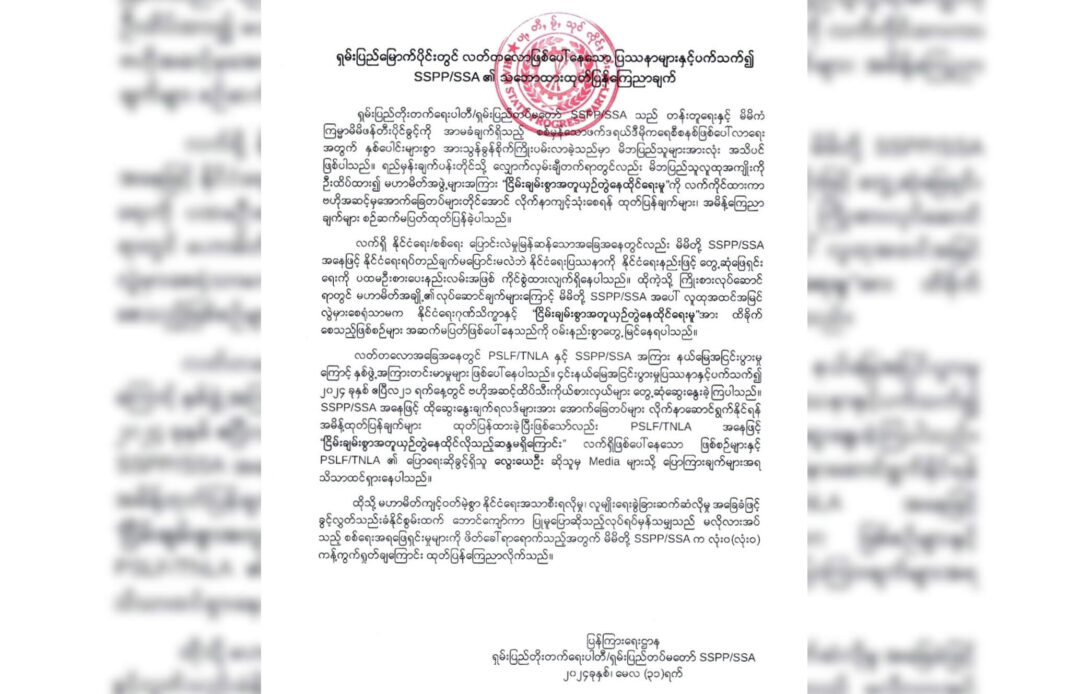
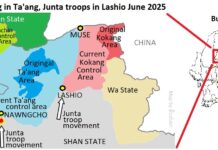
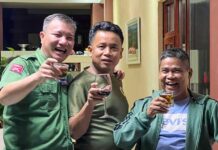
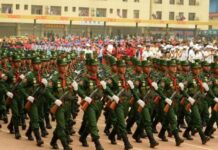
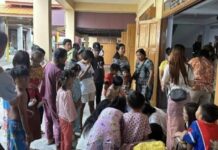
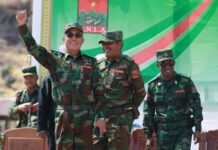






Leave a Comments